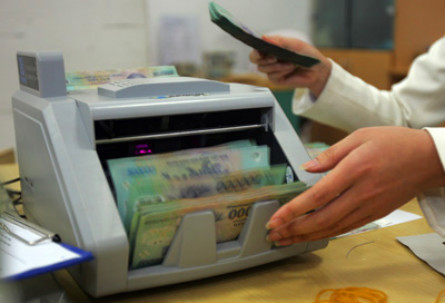Deposit interest rates capped at 14 per cent

Under the regulation, credit organisations will have to apply the capped interest rate to dong deposits as well as to bonds held by individuals and organisations.
Interest rates will not be allowed to exceed 14 per cent per year, even for occasional promotions that are launched to attract depositors or otherwise offering interest rates not in line with the law and the circular.
People's credit funds, however, willl be allowed to apply interest rates as high as 14.5 per cent.
The circular also asked credit organisations to publicise their interest rates when they want to mobilise capital in Vietnamese dong at their transaction points that are regulated by the central bank.
According to the State Bank, the circular's aim is to create more effective use of the interest rate and other monetary tools to curb inflation, stabilise the economy and ensure social stability.
The circular will also be used as a legal basis for settling problems with credit organisations that show signs of violating the central bank's capped interest-rate regulations.
According to independent market watchdogs, dong interest rates jumped to between 17 and 18.5 per cent in late February.
The savings rates is predicted to keep rising because banks in early March on the interbank market began offering a rate of up to 19.5 per cent for three–month deposits per year.
A deputy general director of a small joint-stock commercial bank in HCM City said that most major commercial banks had increased their deposit rates to 16 percent, while the rates at small banks were 17 or 18 per cent, and loan rates were 21 and 23 per cent per year.
The head of a credit office of a major commercial bank in Tan Binh district also revealed that deposit rates at his branch soared to 18.5 percent per year, while banks on the interbank market offered him 19.5 per cent per year.
The new rates were much higher than those of 16.5 per cent recorded two weeks ago.
In the face of such an intense situation, many banks have temporarily stopped lending while some have launched several promotion programmes, including Vietbank and VPBank.
In addition, the deposit rates of the US dollar are still being kept at a high level of 5-6 per cent per year.
Vietcombank last week increased the rate of US dollar deposits by 0.5 per cent to 5.5 per cent per year.
The highest rate has been seen at the Vietnam Tin Nghia Commercial Joint Stock Bank, with 6.17 per cent for three month deposits.
Market analysts attributed the sharp increase in interest rates to high inflation, rapidly increasing prices and banks' efforts to attract more cash.
Many banks also tried to increase their rates for fear of falling into an imbalance between outstanding and mobilised capital, as more and more people were withdrawing their savings to buy gold and US dollars.
State Bank deputy governor Tran Minh Tuan said volume of deposits in January dropped by 3 per cent.
Dong deposits were down by 4.12 per cent but foreign currency deposits soared 4.43 per cent. Meanwhile, loans increased by 1.7 per cent.
While banks were facing difficulties in mobilising capital, the central bank in late January decided to withdraw more than 100 trillion VND ($4.79 billion) out of a total VND132 trillion that it had lent credit organisations before Tet (Lunar New Year).
All these changes had seriously affected small banks' liquidity, Tuan said.
He said the central bank on February 28 injected VND26 trillion through the open market, but that was only a week ago. To make up the deficit, many banks had to adjust, including increasing the deposit interest rates, to raise more money and improve their liquidity.
Many banks were applying a lending interest rate of 24 per cent per year, which could be the death of enterprises that borrowed now, Tuan said.
To ease the situation, the central bank has ordered its provincial branches to intensify the monitoring of cash mobilisation at local banks after news broke that some banks were offering deposit rates of up to 17 per cent a year.
State Bank governor asked the branches to quickly launch inspections into the real savings rates on offer, saying the new circular will be an effective tool to prevent any violations.
What the stars mean:
★ Poor ★ ★ Promising ★★★ Good ★★★★ Very good ★★★★★ Exceptional
 Tag:
Tag:
Related Contents
Latest News
More News
- Cashless payments hit 28 times GDP in 2025 (February 04, 2026 | 18:09)
- SSIAM and DBJ launch Japan Vietnam Capital Fund (February 04, 2026 | 15:57)
- Banks target stronger profits, credit growth in 2026 (February 04, 2026 | 15:43)
- Vietnam on path to investment-grade rating (February 03, 2026 | 13:07)
- Consumer finance sector posts sharp profit growth (February 03, 2026 | 13:05)
- Insurance market building the next chapter of protection (February 02, 2026 | 11:16)
- NAB Innovation Centre underscores Vietnam’s appeal for tech investment (January 30, 2026 | 11:16)
- Vietnam strengthens public debt management with World Bank and IMF (January 30, 2026 | 11:00)
- Corporate bond market poised for stronger growth cycle (January 28, 2026 | 17:13)
- Vietnam's IPO market on recovery trajectory (January 28, 2026 | 17:04)






















 Mobile Version
Mobile Version